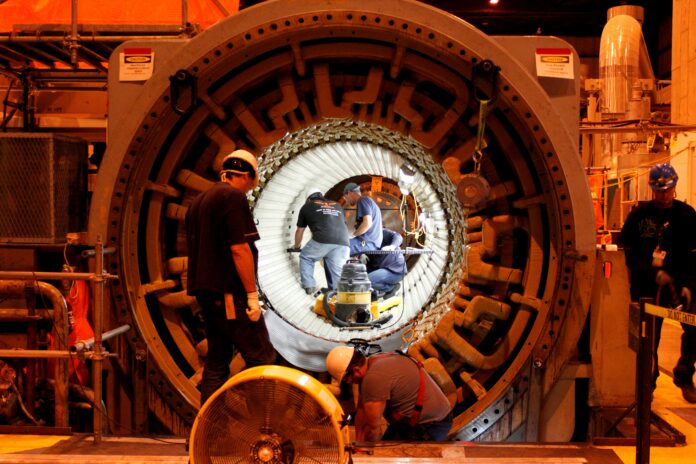
800 additional workers come to town, $58 million invested
By Sarah Binder
PALO–In most industrial workplaces, a shutdown means time for vacation. At the Duane Arnold Energy Center in Palo, it means pumping millions of dollars into the local economy.
Duane Arnold, owned by Next Era Energy, is Iowa’s only nuclear facility. It has to shut down every two years so more fuel can be added to the reactor. During the shutdown, when the plant is less radioactive, workers also perform maintenance on the equipment.
The capital investment during a roughly one-month outage that began on Oct. 6 was estimated at $58 million, and the 800 extra workers brought to town spend about $4.8 million in the community.
“An outage is a very well-choreographed execution,” said Rich Anderson, vice president of Duane Arnold. “We’ve spent two years planning this outage, and about 8,000 tasks.”
Duane Arnold uses both local unionized workers and national nuclear specialists during their outages. Typically, about 40 percent of the fuel will be replaced.
During this outage, the two major maintenance tasks are applying a new layer of protective coating to the torus, a 500,000-gallon water tank that sits under the reactor for emergency cooling; and replacing all of the copper wiring within the main generator. Those two projects will cost about $12 million apiece.
“It’s a large investment, but it’s actually on par with our outages,” said Renee Nelson, communications and public affairs manager for Duane Arnold.
The Duane Arnold Energy Center has been running since 1974, and the license has been renewed until 2034.
“We try to lay out a long-term plan… we don’t just focus on, ‘what do I need to run the next two years,’” Mr. Anderson said. “You can never compromise the overall investment.”
Mr. Anderson started working at Duane Arnold in 1977, and he said the plant is more reliable and efficient than ever, due to the high quality of maintenance that has been performed over the years. He compared it to a new car that gets better after a couple of tune-ups.
Before this year’s shutdown, the plant had been running continuously for 415 days. Ideally, it would run straight from one refueling outage to the next, but it had to shut down in August 2011 as a precaution because sediment from the Cedar River was approaching an intake structure.
“It kind of speaks to the quality of the maintenance,” Ms. Nelson said.
“A good neighbor”
Having Duane Arnold in Palo might have helped to keep Cedar Rapids up and running during the historic floods of 2008.
A report released in September by the Committee on Science, Engineering and Public Policy, a joint unit of the National Academy of Sciences, National Academy of Engineering and the Institute of Medicine, studied the impact of the nearby plant.
The report, titled “Disaster Resilience: A National Imperative,” found that the safety precautions in place because of the nuclear facility helped to prevent the loss of lives during the flood. Duane Arnold staff run formal emergency drills four times per year, working with state, county and city officials each time to prepare for a possible evacuation. The plant is evaluated every two years by U.S. Nuclear Regulatory Commission and by the Federal Emergency Management Agency.
Historically, the plant’s evacuationplans were used on “Toxic Tuesday,” a 1985 disaster. A fire at an abandoned sewage plant in Cedar Rapids released toxic fumes and forced 10,000 people to flee.
Duane Arnold tries to be a good neighbor to Linn County when there isn’t a disaster, too. The plant sits on 500 acres of land, some of which is leased out to farmers. Next Era Energy decided that the money gathered from those tenants should be given back to the community.
Nuclear is a green power source that releases no gasses, Ms. Nelson said, noting that osprey have taken to nesting on their property.
One half-inch uranium fuel pellet can provide as much energy as one ton of coal.
“It’s another alternative in our energy mix,” Mr. Anderson said. “Across the country, we don’t want to have just one source.”
Workers use a duplicate control panel, identical to the main one, to practice responding to emergency situations.
Highly-skilled jobs
Among the 600 permanent employees of Duane Arnold, the average salary is $100,000 per year. Many employees have been with the plant for decades.
The plant has more than 40 full-time trainers to make sure every employee is constantly at their best. Even after becoming fully licensed to nuclear standards, Duane Arnold plant operators spend one out of every six weeks training. They use a simulator that is identical to the actual control panel to practice responding to different situations, such as severe weather or loss of power.
Employees also practice behavior based safety, where they can coach each other on best practices. They help give each other reminders, and Mr. Anderson said it’s important that they know that if they point out an issue to management, it will be taken care of.
The result is a rate of .06 injuries per 200,000 worker hours.
Mr. Anderson said these measures help employees feel like they have ownership in the company. He said paying employees well gets work done, but truly treating them well gets higher levels of engagement and discretionary effort.
It’s a lesson he learned first-hand.
When Mr. Anderson started at Duane Arnold in 1977, his plan was to work for a couple of years to save money and attend the UI. By 1996, he had achieved positions usually not available to people without a degree. After earning his bachelor’s degree in management and organization in 1998 and working in nuclear plants around the country, he returned to Duane Arnold in June 2012.
“If you come to work every day and love your job, it gives you opportunities.”







